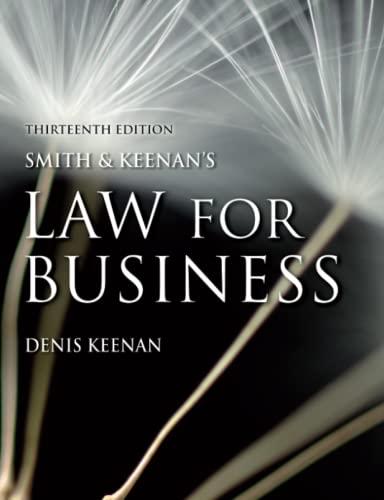Question
Please answer question in this format I. JUDGMENT II LEGAL PRINCIPLE A ISSUE (Question of Law) B HOLDING (Answer of Law) III REASONING A GENERAL
Please answer question in this format
I. JUDGMENT
II LEGAL PRINCIPLE A ISSUE (Question of Law) B HOLDING (Answer of Law)
III REASONING A GENERAL ANALYSIS B APPLIED ANALYSIS
IV JUDGMENT
1. The Chicago National League Ball Club (Chicago Cubs) operated Wrigley Field, the Cubs's home park. page 43-34Through the 1965 baseball season, the Cubs were the only major league baseball team that played no home games at night because Wrigley Field had no lights for nighttime baseball. Philip K. Wrigley, director and president of the corporation, refused to install lights because of his personal opinion that baseball was a daytime sport and that installing lights and scheduling night baseball games would result in the deterioration of the surrounding neighborhood. The other directors assented to this policy. From 1961 to 1965, the Cubs suffered losses from their baseball operations. The Chicago White Sox, whose weekday games were generally played at night, drew many more fans than did the Cubs. A shareholder sued the board of directors to force them to install lights at Wrigley Field and to schedule night games. What did the court rule? Why?
2.Simon J. Michael, a director of Shocking Technologies, was the only representative of the holders of two classes of Shocking preferred stock. Over time, significant disagreements between Michael and the other board members arose over executive compensation and whether preferred shareholders should have increased board representation. Michael argued that the company's governance problems needed to be resolved before it could attract additional equity funding, which the company desperately needed. Michael understood that Shocking's survival likely depended upon a large investment by a third party, Littelfuse. Michael spoke with Littelfuse to try to align Littelfuse's interests with his. Michael not only sought to dissuade Littelfuse from investing in Shocking, but also disclosed to Littelfuse Shocking's confidential business information that Littelfuse was the only potential investor likely to participate in the necessary fund-raising. By informing Littelfuse that there were no other options available to Shocking, Michael gave Littelfuse a significantly enhanced strategic bargaining position with Shocking. Michael believed that Shocking's resulting cash crunch would force the rest of the board to implement his objectives, which he believed served the interests of the preferred shareholders. Did Michael breach his fiduciary duty to Shocking?
Step by Step Solution
There are 3 Steps involved in it
Step: 1

Get Instant Access to Expert-Tailored Solutions
See step-by-step solutions with expert insights and AI powered tools for academic success
Step: 2

Step: 3

Ace Your Homework with AI
Get the answers you need in no time with our AI-driven, step-by-step assistance
Get Started


